语言与文化
语言与文化的关系与影响
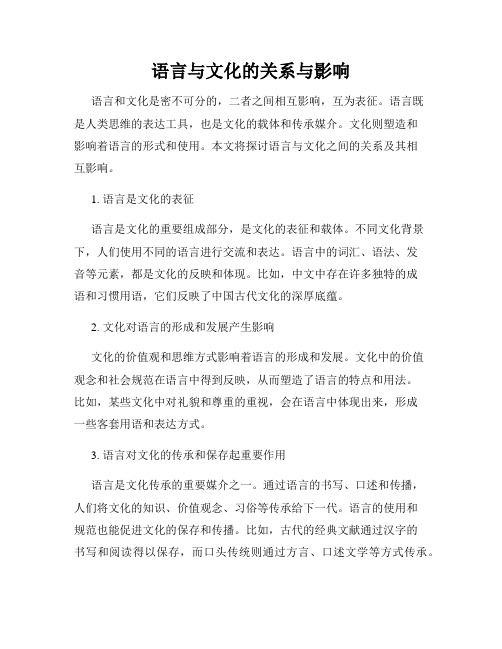
语言与文化的关系与影响语言和文化是密不可分的,二者之间相互影响,互为表征。
语言既是人类思维的表达工具,也是文化的载体和传承媒介。
文化则塑造和影响着语言的形式和使用。
本文将探讨语言与文化之间的关系及其相互影响。
1. 语言是文化的表征语言是文化的重要组成部分,是文化的表征和载体。
不同文化背景下,人们使用不同的语言进行交流和表达。
语言中的词汇、语法、发音等元素,都是文化的反映和体现。
比如,中文中存在许多独特的成语和习惯用语,它们反映了中国古代文化的深厚底蕴。
2. 文化对语言的形成和发展产生影响文化的价值观和思维方式影响着语言的形成和发展。
文化中的价值观念和社会规范在语言中得到反映,从而塑造了语言的特点和用法。
比如,某些文化中对礼貌和尊重的重视,会在语言中体现出来,形成一些客套用语和表达方式。
3. 语言对文化的传承和保存起重要作用语言是文化传承的重要媒介之一。
通过语言的书写、口述和传播,人们将文化的知识、价值观念、习俗等传承给下一代。
语言的使用和规范也能促进文化的保存和传播。
比如,古代的经典文献通过汉字的书写和阅读得以保存,而口头传统则通过方言、口述文学等方式传承。
4. 语言的多样性反映了文化的多元性不同地区和民族拥有不同的语言,这种多样性反映了文化的多元性。
每一种语言都蕴含着独特的文化观念和生活方式。
语言的多样性使得人们能够以不同的方式思考和表达,促进了世界文化的交流和发展。
5. 语言对思维方式和认知的影响语言不仅仅是表达思维的工具,它还塑造和影响着人们的思维方式和认知方式。
不同语言中的语法结构、词汇表达等差异,影响着人们对世界的理解和认知方式。
比如,中文的象形文字和英文的字母表达,对人们的思维方式产生了不同的影响。
总之,语言与文化之间存在着密切的关系与相互影响。
语言既是文化的表征和载体,也由文化塑造和影响着。
通过语言的使用和传承,人们能够传递和保存文化的知识、价值观念和习俗。
同时,语言也与思维方式和认知紧密相连,塑造着人们对世界的理解方式。
语言和文化的关系并举例
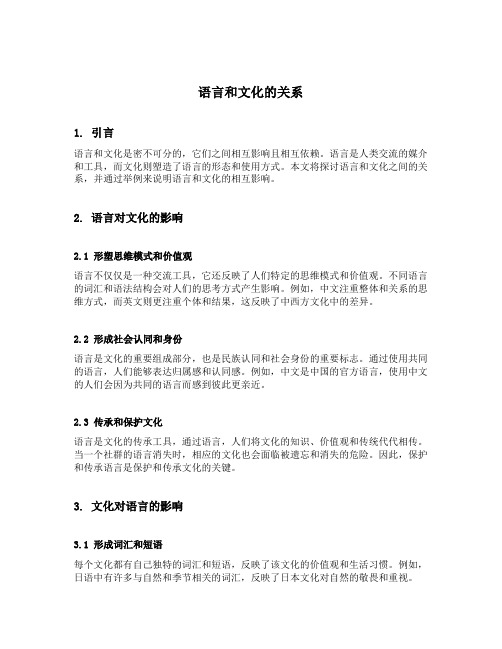
语言和文化的关系1. 引言语言和文化是密不可分的,它们之间相互影响且相互依赖。
语言是人类交流的媒介和工具,而文化则塑造了语言的形态和使用方式。
本文将探讨语言和文化之间的关系,并通过举例来说明语言和文化的相互影响。
2. 语言对文化的影响2.1 形塑思维模式和价值观语言不仅仅是一种交流工具,它还反映了人们特定的思维模式和价值观。
不同语言的词汇和语法结构会对人们的思考方式产生影响。
例如,中文注重整体和关系的思维方式,而英文则更注重个体和结果,这反映了中西方文化中的差异。
2.2 形成社会认同和身份语言是文化的重要组成部分,也是民族认同和社会身份的重要标志。
通过使用共同的语言,人们能够表达归属感和认同感。
例如,中文是中国的官方语言,使用中文的人们会因为共同的语言而感到彼此更亲近。
2.3 传承和保护文化语言是文化的传承工具,通过语言,人们将文化的知识、价值观和传统代代相传。
当一个社群的语言消失时,相应的文化也会面临被遗忘和消失的危险。
因此,保护和传承语言是保护和传承文化的关键。
3. 文化对语言的影响3.1 形成词汇和短语每个文化都有自己独特的词汇和短语,反映了该文化的价值观和生活习惯。
例如,日语中有许多与自然和季节相关的词汇,反映了日本文化对自然的敬畏和重视。
3.2 塑造语法和语用文化也会影响到语言的语法和语用规范。
不同文化对于礼貌和语境的要求有所不同,这会导致语言的使用方式产生差异。
例如,日本人在交流中更注重客套和尊称,而西方社交场合更强调直接和简洁的表达方式。
3.3 影响口音和语音特色文化背景也会影响到人们的口音和语音特色。
不同语言和文化有不同的音素和语音规律,这导致了不同文化的人们在发音上的差异。
例如,英语作为国际通用语言,受到许多非英语母语国家的影响,产生了各种不同的口音和语音特点。
4. 语言和文化的相互作用举例4.1 西班牙语和西班牙文化西班牙语是西班牙的官方语言,也是拉丁美洲大部分国家的官方语言。
语言与文化之间的关系
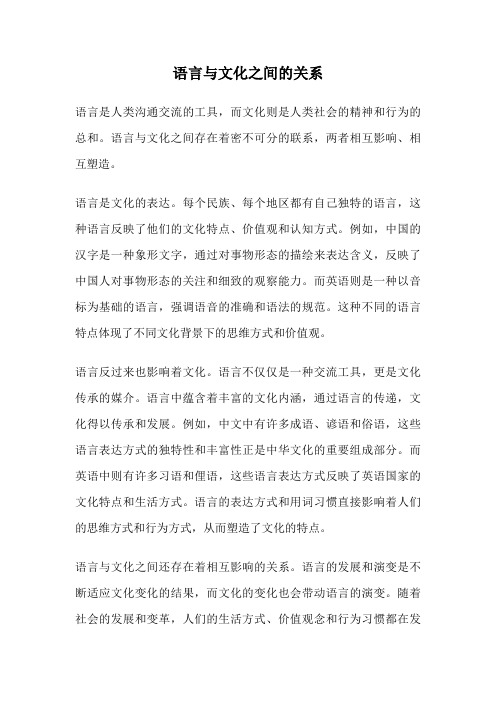
语言与文化之间的关系语言是人类沟通交流的工具,而文化则是人类社会的精神和行为的总和。
语言与文化之间存在着密不可分的联系,两者相互影响、相互塑造。
语言是文化的表达。
每个民族、每个地区都有自己独特的语言,这种语言反映了他们的文化特点、价值观和认知方式。
例如,中国的汉字是一种象形文字,通过对事物形态的描绘来表达含义,反映了中国人对事物形态的关注和细致的观察能力。
而英语则是一种以音标为基础的语言,强调语音的准确和语法的规范。
这种不同的语言特点体现了不同文化背景下的思维方式和价值观。
语言反过来也影响着文化。
语言不仅仅是一种交流工具,更是文化传承的媒介。
语言中蕴含着丰富的文化内涵,通过语言的传递,文化得以传承和发展。
例如,中文中有许多成语、谚语和俗语,这些语言表达方式的独特性和丰富性正是中华文化的重要组成部分。
而英语中则有许多习语和俚语,这些语言表达方式反映了英语国家的文化特点和生活方式。
语言的表达方式和用词习惯直接影响着人们的思维方式和行为方式,从而塑造了文化的特点。
语言与文化之间还存在着相互影响的关系。
语言的发展和演变是不断适应文化变化的结果,而文化的变化也会带动语言的演变。
随着社会的发展和变革,人们的生活方式、价值观念和行为习惯都在发生改变,这也会反映在语言的使用上。
例如,随着科技的发展,新词汇不断出现,以适应人们对新事物的命名和表达需求。
同时,随着社会的多元化和全球化,不同文化之间的交流增多,语言也在不断吸收和融合其他文化的元素,形成新的表达方式和语言习惯。
总结起来,语言与文化是紧密相连的,两者相互影响、相互塑造。
语言是文化的表达和传承媒介,而文化则通过语言的传递和演变得以发展和传承。
语言与文化之间的关系是一种相互促进、相互依存的关系,共同构成了人类社会的丰富多样性。
我们应该重视语言与文化的关系,加深对不同文化背景下的语言特点和价值观的理解,以促进跨文化交流和相互理解的发展。
文化语言学语言与文化课件

包括迷失、困惑、恐惧、愤怒、焦虑等情绪反应,以及行为上的不 适应、社交障碍等。
文化休克的应对策略
包括学习新文化的语言、习俗、价值观等,寻求帮助和支持,以及 积极融入新文化等。
04
语言与文化的教育
语言与文化教育的意义
促进文化传承
通过语言与文化的教育,可以更好地传承和弘扬民族文化,增进学 生对本土文化的了解和认同。
详细描述
语篇的结构、风格、修辞手法等都反映了特定的文化背景和价值观。理解语篇中 的文化内涵有助于深入理解语言和文化的交互作用。
03
跨文化交际中的语言问 题
文化差异对语言交际的影响
语言行为差异
不同文化背景下,人们的语言行 为和表达方式存在差异,如寒暄 、道别、感谢、道歉等,这些差
异可能引发误解或冲突。
语言与文化的互动关系
01
语言与文化的相互依存
语言与文化相互依存,互为表里。语言是文化的表现形式和载体,而文
化则是语言的内涵和基础。
02
语言与文化的相互影响
语言与文化之间的互动关系是动态的,它们相互影响、相互塑造。语言
的使用和发展受到文化的影响和制约,而文化则通过语言表达和传承。
03
跨文化交流中的语言与文化
跨学科融合
将语言学和文化学的研究方法、 视角和理论进行跨学科融合,以 更全面地揭示语言与文化的复杂
关系。
深化对比研究
对比不同语言和文化之间的异同 ,揭示各种语言和文化在表达、 思维和行为方式上的特点,为跨 文化交流和外语教学提供指导。
01
03
02 04
关注语言的演变
深入研究语言的发展和演变过程 ,揭示语言在历史长河中的变迁 以及背后的社会、文化和心理因 素。
语言与文化

2.方言 方言是在古代社会历史条件下产生的, 当人们由于地理或社会原因被隔离时,就开 始了方言分化,尤其表现在语音的区别上。
汉语方言可以分为七大方言区,即北方 方言(官话方言)、吴方言、湘方言、赣方 言、客家方言、闽方言和粤方言。
19
也有将汉语方言划分为十大方言区的, 即官话区、晋语区[山西、内蒙古(中南部)、 陕西(北部)、河北(局部)有入声的方言 划为晋语]、吴语区、徽语区[皖南一带的徽 州方言]、赣语区、湘语区、闽语区、粤语区、 平话区[社会生活的纽带,当社会生活分离
时,统一的纽带就可能一分为二。长期稳定的
行政区划,必然使同一区划中的语言、风俗等
文化因素趋向一体化。
广西北部的全州、资源、灌阳、兴安四个
县市的地域在历史上长期属于以长沙为中心的
行政区划里,直至明代以后才归属广西省,所
以至今通行湘方言。而湖南的沅、醴流域在长
6
制度文化是指种种制度和理论体系。诸如 饮食习惯、建筑工艺、卫生管理、娱乐方式等 生活制度,婚姻形式、亲属关系、家庭财产分 配等家庭制度,劳动管理、艺术生产、教育、 道德、风俗、宗教、利益、法律、政治、警察、 军队等社会制度,以及有关这些制度的各种理 论体系。
7
心理文化包括思维方式、审美情 趣、宗教信仰、价值观念等等,比之 物质文化和制度文化,心理文化处于 更深的层次上。
30
3.地理的阻隔
地理的阻隔在古代往往成为方言分化的 条件。闽语、粤语较多保留古汉语成分,跟 这两种方言所处的地理位置有关:广东、福 建以前交通不便,地处南方边缘区域,人员 往来、接触相对较少,其语言便少有变化; 而中原地区汉语由于各种原因,发展速度较 快,形成方言间的差异。
31
4.民族的融合
语言与文化的关系
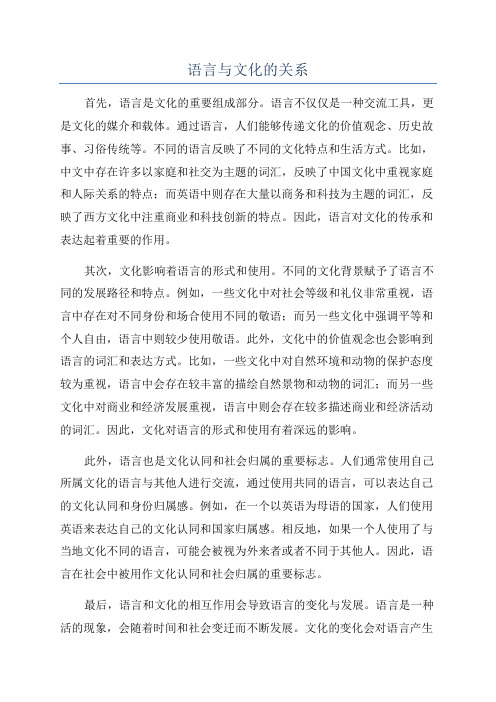
语言与文化的关系首先,语言是文化的重要组成部分。
语言不仅仅是一种交流工具,更是文化的媒介和载体。
通过语言,人们能够传递文化的价值观念、历史故事、习俗传统等。
不同的语言反映了不同的文化特点和生活方式。
比如,中文中存在许多以家庭和社交为主题的词汇,反映了中国文化中重视家庭和人际关系的特点;而英语中则存在大量以商务和科技为主题的词汇,反映了西方文化中注重商业和科技创新的特点。
因此,语言对文化的传承和表达起着重要的作用。
其次,文化影响着语言的形式和使用。
不同的文化背景赋予了语言不同的发展路径和特点。
例如,一些文化中对社会等级和礼仪非常重视,语言中存在对不同身份和场合使用不同的敬语;而另一些文化中强调平等和个人自由,语言中则较少使用敬语。
此外,文化中的价值观念也会影响到语言的词汇和表达方式。
比如,一些文化中对自然环境和动物的保护态度较为重视,语言中会存在较丰富的描绘自然景物和动物的词汇;而另一些文化中对商业和经济发展重视,语言中则会存在较多描述商业和经济活动的词汇。
因此,文化对语言的形式和使用有着深远的影响。
此外,语言也是文化认同和社会归属的重要标志。
人们通常使用自己所属文化的语言与其他人进行交流,通过使用共同的语言,可以表达自己的文化认同和身份归属感。
例如,在一个以英语为母语的国家,人们使用英语来表达自己的文化认同和国家归属感。
相反地,如果一个人使用了与当地文化不同的语言,可能会被视为外来者或者不同于其他人。
因此,语言在社会中被用作文化认同和社会归属的重要标志。
最后,语言和文化的相互作用会导致语言的变化与发展。
语言是一种活的现象,会随着时间和社会变迁而不断发展。
文化的变化会对语言产生影响,反过来,语言的变化也会影响到文化的发展。
例如,随着科技的进步和国际交流的增加,新的词汇和表达方式不断涌现出来,反映了当今社会的新事物和新概念。
另外,语言的变化也会影响到文学、艺术和传媒等文化领域,进一步推动文化的发展和变革。
语言与文化的关系

语言与文化的关系语言与文化是密不可分的,两者相互影响、相互渗透。
语言是人类交流的工具,同时也是文化的载体,而文化则是人类生活的基础和精神内涵,两者相互依存,相互作用,共同构成了人类社会的基础。
一、语言是文化的载体语言作为文化的表达形式和传承工具,承载了丰富的文化信息。
每一种语言都与其所代表的文化密切相关,其中包含了丰富的文化内涵和特色,反映了当地人民的习俗、信仰、价值观、生活方式等方面的文化,从而彰显出了该文化的独特性和思维方式。
例如,中国的汉字是一种具有悠久历史和文化底蕴的文字,它是中国文化的重要组成部分,承载了中国5000多年的文化传统与精神内涵。
汉字中的每一个字形都蕴含着深刻的哲学思想和文化价值,如“道”字所代表的思想就体现了中国古代哲学的精髓。
同样,在西方国家,英语作为一种主流语言,同样拥有自己独特的文化特色和内涵,它所包含的一系列文化习俗、表达方式和价值观等,反映了西方文化的不同方面。
通过了解不同语言所代表的文化内涵,我们能更好的了解和认识当地的文化和民俗,从而增加彼此之间的理解和交流,推动文化的多元化和社会的进步。
二、文化影响语言语言是文化的表达形式,而文化也会对语言的产生和发展产生影响。
随着时间的推进和社会的发展,文化本身会不断地发展和演变,从而导致文化所包含的语言也发生了相应的变化。
以中国为例,随着中国经济的飞速发展,中国的社会文化也在不断地变化和发展。
在这一过程中,中国的语言也发生了变化。
比如,一些新兴的行业和新事物会引入一些新词语,这些新词加入到了中文中,并逐渐普及,例如“互联网”、“电子商务”等词汇。
而同样的,在西方国家也存在这样的现象,例如近年来出现的一些新的网络词汇,如“selfie”(自拍)、“emoji”(表情符号)等。
同时,由于不同文化之间的差异和交流,语言也在慢慢融合和继承,比如一些英文词汇的拼写和发音等,被融入到一些汉字中,形成了一些独特的汉字发音。
同时,一些句型、表达方式等也从其他语言中借鉴和继承,经过改编后形成自己独特的表达方式,例如中国地方方言中的一些特色表达方式。
语言与文化的关系
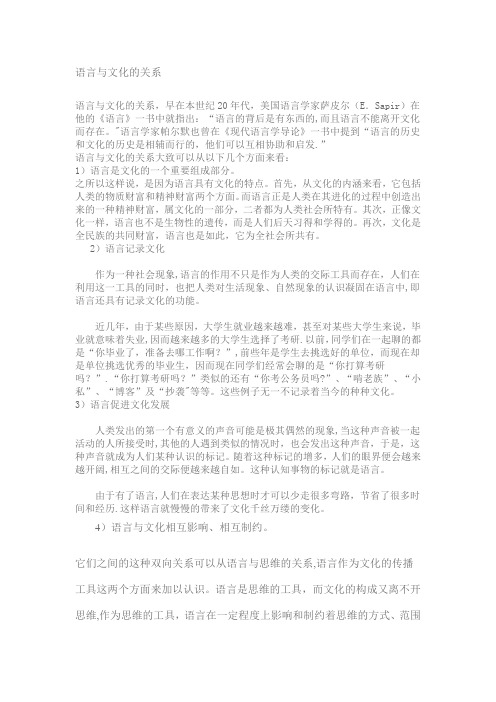
语言与文化的关系语言与文化的关系,早在本世纪20年代,美国语言学家萨皮尔(E.Sapir)在他的《语言》一书中就指出:“语言的背后是有东西的,而且语言不能离开文化而存在。
"语言学家帕尔默也曾在《现代语言学导论》一书中提到“语言的历史和文化的历史是相辅而行的,他们可以互相协助和启发.”语言与文化的关系大致可以从以下几个方面来看:1)语言是文化的一个重要组成部分。
之所以这样说,是因为语言具有文化的特点。
首先,从文化的内涵来看,它包括人类的物质财富和精神财富两个方面。
而语言正是人类在其进化的过程中创造出来的一种精神财富,属文化的一部分,二者都为人类社会所特有。
其次,正像文化一样,语言也不是生物性的遗传,而是人们后天习得和学得的。
再次,文化是全民族的共同财富,语言也是如此,它为全社会所共有。
2)语言记录文化作为一种社会现象,语言的作用不只是作为人类的交际工具而存在,人们在利用这一工具的同时,也把人类对生活现象、自然现象的认识凝固在语言中,即语言还具有记录文化的功能。
近几年,由于某些原因,大学生就业越来越难,甚至对某些大学生来说,毕业就意味着失业,因而越来越多的大学生选择了考研.以前,同学们在一起聊的都是“你毕业了,准备去哪工作啊?”,前些年是学生去挑选好的单位,而现在却是单位挑选优秀的毕业生,因而现在同学们经常会聊的是“你打算考研吗?”.“你打算考研吗?”类似的还有“你考公务员吗?”、“啃老族”、“小私”、“博客”及“抄袭"等等。
这些例子无一不记录着当今的种种文化。
3)语言促进文化发展人类发出的第一个有意义的声音可能是极其偶然的现象,当这种声音被一起活动的人所接受时,其他的人遇到类似的情况时,也会发出这种声音,于是,这种声音就成为人们某种认识的标记。
随着这种标记的增多,人们的眼界便会越来越开阔,相互之间的交际便越来越自如。
这种认知事物的标记就是语言。
由于有了语言,人们在表达某种思想时才可以少走很多弯路,节省了很多时间和经历.这样语言就慢慢的带来了文化千丝万缕的变化。
《语言与文化》课件

03 语言与文化在教育中的体 现
语言教育中的文化教学
语言和文化密不可分
语言是文化的载体,文化通过语言表 达和传递。在语言教学中,应充分融 入文化背景和内涵,帮助学生更好地 理解和运用语言。
文化教学的重要性
了解目的语国家的文化有助于培养学 生的跨文化意识和沟通能力,避免文 化误解和冲突,促进国际交流与合作 。
在全球化的背景下,应该尊重和保护文化的多样性,促进不同文化之间的交流和理 解。
如何推动语言与文化的传承和发展
政府和社会应该加大对语言与文化传 承和发展的投入,提供资金、技术和 人才支持。
鼓励创新和发展,将传统语言和文化 与现代科技、艺术等相结合,创造出 具有时代特色的文化产品。
加强教育和宣传,提高人们对语言与 文化传承和发展的认识和重视程度。
开展文化实践活动
组织学生参加文化交流活动、实地考察、体验式学习等,让学生在实践中感受和体验目的语国家的文化,提高跨 文化交际能力。
04 语言与文化的传承和发展
语言与非物质文化遗产保护
语言是文化的重要组成部分,也 是非物质文化遗产的重要载体。
保护语言非物质文化遗产对于维 护文化多样性和人类文明的发展
提高跨文化交际能力的方法
增强文化敏感性和意识
实践和参与
了解不同文化背景下的价值观、信仰 、习俗等,尊重和包容文化差异,避 免文化冲突。
通过实际交往和参与不同文化背景下 的活动,增强跨文化交际能力,积累 经验。
学习跨文化沟通技巧
掌握有效的沟通技巧,如倾听、表达 、非言语交际等,以提高跨文化交际 的效果。
语言与文化的互动关系
语言与文化相互依存、相互影响。语言反映并塑造文化, 同时文化也制约着语言的演变和发展。了解语言与文化的 相互关系有助于更好地理解和传承文化。
如何将语言教学与文化传承有机结合

如何将语言教学与文化传承有机结合语言是文化的重要载体,文化是语言的灵魂所在。
在当今全球化的时代背景下,将语言教学与文化传承有机结合具有重要的意义和价值。
这不仅能够帮助学习者更好地掌握语言,还能培养他们对不同文化的理解和尊重,促进文化的交流与融合。
一、深入理解语言与文化的关系语言和文化是相互依存、相互影响的。
语言反映了一个民族的思维方式、价值观念、社会习俗和历史传统。
例如,汉语中的成语、谚语、诗词等都蕴含着丰富的文化内涵。
而文化则赋予了语言以生命和意义,使其不仅仅是简单的符号和声音。
在语言教学中,我们不能仅仅关注语法和词汇的学习,而应该引导学生去探究语言背后的文化因素。
比如,学习英语时,了解西方的节日、礼仪、价值观等文化知识,能够帮助学生更准确地理解和运用英语。
二、在教材编写中融入文化元素教材是语言教学的重要依据,因此在教材编写中应充分融入文化元素。
可以选择具有代表性的文学作品、历史故事、民间传说等作为课文,让学生在阅读和学习的过程中感受文化的魅力。
同时,教材中的练习和活动也可以围绕文化主题展开。
比如,通过角色扮演、小组讨论等方式,让学生模拟不同文化背景下的交际场景,培养他们的跨文化交际能力。
此外,教材还可以配备丰富的图片、音频、视频等多媒体资料,直观地展示不同文化的特色和风貌,增强学生的学习兴趣和文化感知。
三、教师在教学过程中的引导作用教师是语言教学与文化传承的关键角色。
教师自身应具备丰富的文化知识和跨文化交际能力,能够在教学中灵活地将文化知识传授给学生。
在课堂教学中,教师可以采用多种教学方法来融合语言与文化。
比如,通过文化对比的方式,让学生发现不同语言和文化之间的差异和相似之处。
在讲解词汇和语法时,结合文化背景进行解释,帮助学生理解其深层含义。
教师还可以组织文化专题讲座、文化体验活动等,让学生亲身体验不同文化的魅力。
比如,邀请外国友人来校交流,举办国际文化节等。
四、创设真实的语言文化环境语言学习需要真实的语境,文化传承也需要相应的环境氛围。
语言和文化之间的关系是什么?

语言和文化之间的关系是什么?语言是人类交流和沟通的基础工具,而文化则是人类社会的文明体现。
语言和文化的关系密切,它们相互依存、相互影响。
下面我们从三个方面来深入探讨它们之间的关系。
一、语言是文化的载体语言是一个民族、一个国家文化的重要组成部分,它可以体现文化的特点和精神内涵。
举个例子,中文中涉及到的一些成语、谚语、俗语等都是中国文化的独特表现,通过它们能够深入了解中国文化的传统和价值。
同样的道理,不同国家和民族的语言中,都有自己的文化价值和特色,这也为语言研究和学习提供了更加丰富的资源。
二、文化对语言的影响语言的词汇、语法等方面与文化密切相关,语言的表达方式和传递信息的方式也与文化密不可分。
比如,在英文中,“蓝色”表示着冷静、稳重的意思,而在中文中“蓝色”则有着沉静、宁静的意思。
这是因为,英美文化中传统地与红、黄、蓝三种颜色有关,而在中国传统文化中,蓝色与清新、深远有着密切联系。
再比如,在阿拉伯文化中,因为回教的传统和观念,他们禁酒,所以在阿拉伯语中,“酒”这个词组就被用来表示“沙漠”。
文化对语言的影响,不仅仅只是词汇上的不同,还可以表现在语音和语调等方面,这些差异为跨文化交流带来了很大困扰。
三、语言和文化构建了群体与社会的身份认同语言和文化成为了人们归属某个社会群体和建立身份认同的依据。
通过学习别人的语言和文化,学习他们的风俗习惯以及社会规范,我们就可以建立起和他们的亲密感和认同感。
比如,西方的“礼尚往来”的社交礼仪传统被广泛地传递,并与西方文化紧密联系在了一起。
穆斯林的文化传统是非常注重礼仪和仪式感的,这也被体现在了他们相互交往的方式和行为习惯上。
通过学习其他民族与国家的文化和语言,我们不仅仅可以拓宽视野,还可以建立起与他们的情感纽带,实现和谐共处和互利互惠的合作关系。
总之,语言和文化之间的关系十分密切,二者相互依存,相互影响,并互为表里。
学习其他国家和民族的语言和文化,不仅是个人的文化素质的提高,也是促进不同文化间相互交流与理解的基础,为全球化的时代提供了深层次的文化支持。
语言和文化之间的联系是什么,如何形成文化认同?

语言和文化之间的联系是什么,如何形成文化认同?语言和文化是息息相关的,如何理解语言和文化之间的联系以及如何形成文化认同,是很多人关注的问题。
下面本篇科普文章将从三个方面为大家详细介绍。
一、语言是文化的载体语言是人们交流思想和文化的工具,也是文化传承的重要载体。
不同的国家和地区有着自己独特的语言,这些语言不仅具有沟通交流的功能,更是所在地区文化背景下的标志性符号。
例如,法国人民的语言是法语,这是法国文化的重要组成部分,关于法国文化,就不得不提到法语这个象征。
二、语言与文化相互影响,它们两者之间有着一个相互作用的过程,对于语言来说,语言的使用和发展都和文化密切相关。
以汉语为例,汉语中的很多词汇都有着丰富的文化内涵,比如“春节”、“清明节”等,这与华夏文化紧密相关。
类似的,不同的国家和地区具有不同的语言,这也反映出它们所处的文化背景的不同。
三、语言和文化的融合与文化认同语言和文化的融合是文化认同的重要来源。
当两种文化相遇之后,它们的语言的交流就变得必不可少。
语言作为传递文化的工具,把文化更加直观地呈现给人们。
文化认同是指强烈的意识和信念,认为自己属于特定的文化,并对此进行维护和传承。
当人们接触到不同的文化时,他们的文化认同就会改变。
因此,通过语言交流加深了文化融合,促进了文化的传承和发展。
综上所述,语言和文化之间的联系是密不可分的。
语言作为文化的载体,传递了文化的信息并且与文化相互影响。
文化认同是通过语言的交流和文化的交流实现的,实现了不同文化之间的融合和共存。
对于我们来说,只有通过对语言和文化之间的深入了解,才能更好地认识不同文化,才能更好地适应多元化的社会。
论述语言与文化的关系
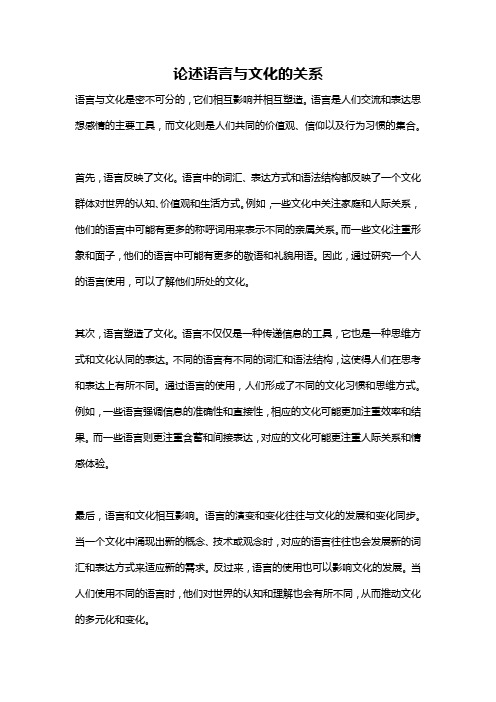
论述语言与文化的关系
语言与文化是密不可分的,它们相互影响并相互塑造。
语言是人们交流和表达思想感情的主要工具,而文化则是人们共同的价值观、信仰以及行为习惯的集合。
首先,语言反映了文化。
语言中的词汇、表达方式和语法结构都反映了一个文化群体对世界的认知、价值观和生活方式。
例如,一些文化中关注家庭和人际关系,他们的语言中可能有更多的称呼词用来表示不同的亲属关系。
而一些文化注重形象和面子,他们的语言中可能有更多的敬语和礼貌用语。
因此,通过研究一个人的语言使用,可以了解他们所处的文化。
其次,语言塑造了文化。
语言不仅仅是一种传递信息的工具,它也是一种思维方式和文化认同的表达。
不同的语言有不同的词汇和语法结构,这使得人们在思考和表达上有所不同。
通过语言的使用,人们形成了不同的文化习惯和思维方式。
例如,一些语言强调信息的准确性和直接性,相应的文化可能更加注重效率和结果。
而一些语言则更注重含蓄和间接表达,对应的文化可能更注重人际关系和情感体验。
最后,语言和文化相互影响。
语言的演变和变化往往与文化的发展和变化同步。
当一个文化中涌现出新的概念、技术或观念时,对应的语言往往也会发展新的词汇和表达方式来适应新的需求。
反过来,语言的使用也可以影响文化的发展。
当人们使用不同的语言时,他们对世界的认知和理解也会有所不同,从而推动文化的多元化和变化。
综上所述,语言与文化是相互关联的,它们互相影响并塑造了彼此。
通过语言,可以了解和理解一个文化的价值观、行为模式和社会规范,同时语言的使用也受到文化的影响,从而形成不同的语言习惯和思维方式。
语言和文化的关系
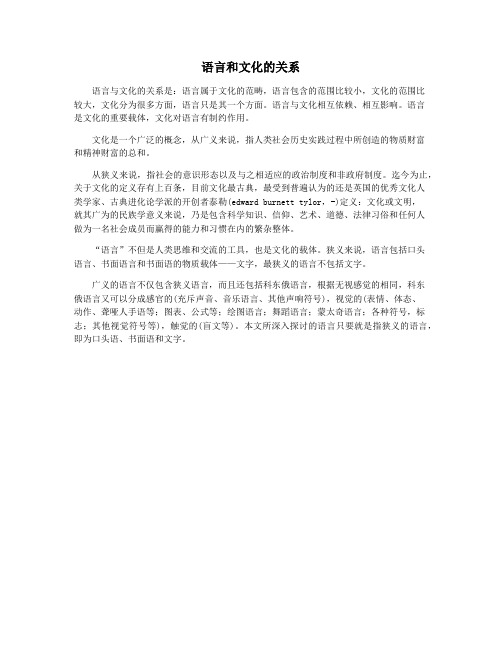
语言和文化的关系
语言与文化的关系是:语言属于文化的范畴,语言包含的范围比较小,文化的范围比
较大,文化分为很多方面,语言只是其一个方面。
语言与文化相互依赖、相互影响。
语言
是文化的重要载体,文化对语言有制约作用。
文化是一个广泛的概念,从广义来说,指人类社会历史实践过程中所创造的物质财富
和精神财富的总和。
从狭义来说,指社会的意识形态以及与之相适应的政治制度和非政府制度。
迄今为止,关于文化的定义存有上百条,目前文化最古典,最受到普遍认为的还是英国的优秀文化人
类学家、古典进化论学派的开创者泰勒(edward burnett tylor,-)定义:文化或文明,
就其广为的民族学意义来说,乃是包含科学知识、信仰、艺术、道德、法律习俗和任何人
做为一名社会成员而赢得的能力和习惯在内的繁杂整体。
“语言”不但是人类思维和交流的工具,也是文化的载体。
狭义来说,语言包括口头
语言、书面语言和书面语的物质载体——文字,最狭义的语言不包括文字。
广义的语言不仅包含狭义语言,而且还包括科东俄语言,根据无视感觉的相同,科东
俄语言又可以分成感官的(充斥声音、音乐语言、其他声响符号),视觉的(表情、体态、
动作、聋哑人手语等;图表、公式等;绘图语言;舞蹈语言;蒙太奇语言;各种符号,标志;其他视觉符号等),触觉的(盲文等)。
本文所深入探讨的语言只要就是指狭义的语言,即为口头语、书面语和文字。
语言与文化之间的关系是什么?
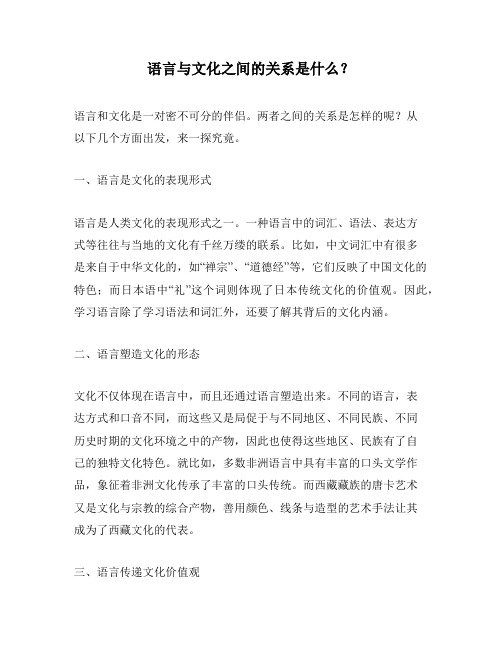
语言与文化之间的关系是什么?语言和文化是一对密不可分的伴侣。
两者之间的关系是怎样的呢?从以下几个方面出发,来一探究竟。
一、语言是文化的表现形式语言是人类文化的表现形式之一。
一种语言中的词汇、语法、表达方式等往往与当地的文化有千丝万缕的联系。
比如,中文词汇中有很多是来自于中华文化的,如“禅宗”、“道德经”等,它们反映了中国文化的特色;而日本语中“礼”这个词则体现了日本传统文化的价值观。
因此,学习语言除了学习语法和词汇外,还要了解其背后的文化内涵。
二、语言塑造文化的形态文化不仅体现在语言中,而且还通过语言塑造出来。
不同的语言,表达方式和口音不同,而这些又是局促于与不同地区、不同民族、不同历史时期的文化环境之中的产物,因此也使得这些地区、民族有了自己的独特文化特色。
就比如,多数非洲语言中具有丰富的口头文学作品,象征着非洲文化传承了丰富的口头传统。
而西藏藏族的唐卡艺术又是文化与宗教的综合产物,善用颜色、线条与造型的艺术手法让其成为了西藏文化的代表。
三、语言传递文化价值观语言不仅仅是人们交流的工具,更是一个传递文化价值观的载体。
在文化中,语言可以通过口头和书面的形式传递文化内涵和知识。
比如,在中国,成语和谚语是中国文化传统的重要组成部分,如“让子弹飞一会儿”就体现了中国人那种去虚拟化的哲学观。
当初像罗萨·帕克,乔治·奥威尔等作家通过文学作品表达对英国社会的不满,通过小说让思想和价值观念的传递产生的时代性影响。
综上所述,语言和文化是一体两面的。
语言是文化的表现形式,可以塑造文化的形态,而好的语言则可以传递文化价值观,完美呈现出文化内涵和人文情感。
因此,我们对于语言和文化要有更深入的了解,才能更好地传承和弘扬它们。
语言与文化的关系
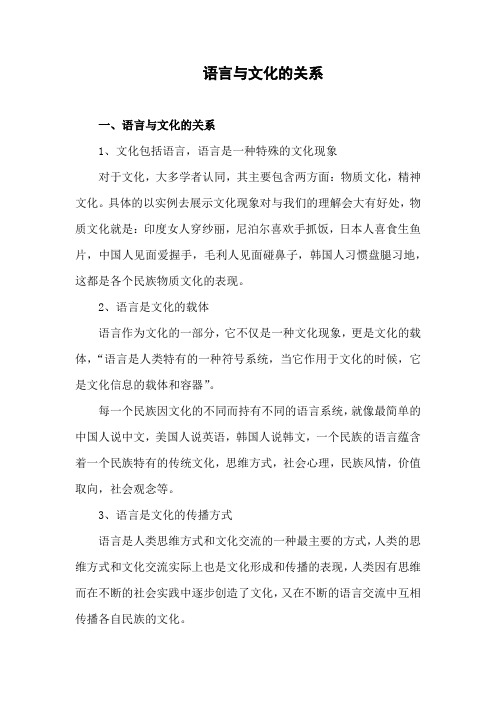
语言与文化的关系一、语言与文化的关系1、文化包括语言,语言是一种特殊的文化现象对于文化,大多学者认同,其主要包含两方面:物质文化,精神文化。
具体的以实例去展示文化现象对与我们的理解会大有好处,物质文化就是:印度女人穿纱丽,尼泊尔喜欢手抓饭,日本人喜食生鱼片,中国人见面爱握手,毛利人见面碰鼻子,韩国人习惯盘腿习地,这都是各个民族物质文化的表现。
2、语言是文化的载体语言作为文化的一部分,它不仅是一种文化现象,更是文化的载体,“语言是人类特有的一种符号系统,当它作用于文化的时候,它是文化信息的载体和容器”。
每一个民族因文化的不同而持有不同的语言系统,就像最简单的中国人说中文,美国人说英语,韩国人说韩文,一个民族的语言蕴含着一个民族特有的传统文化,思维方式,社会心理,民族风情,价值取向,社会观念等。
3、语言是文化的传播方式语言是人类思维方式和文化交流的一种最主要的方式,人类的思维方式和文化交流实际上也是文化形成和传播的表现,人类因有思维而在不断的社会实践中逐步创造了文化,又在不断的语言交流中互相传播各自民族的文化。
4、语言的形成和文化的发展相互制约虽然说语言是文化的一部分,又是文化的反映和传播工具,但并不是说语言就不如文化重要,也不是从属于文化,鉴于语言的特殊性,笔者认为语言和文化就像是一对孪生兄弟,共同形成,共同成长,它们之间是相互依赖相互影响不可分割的。
二、语言的特点1、指向性:语言具备指向性,语言的指向性使语言的含义描述可以指向对应的事、物。
如:树、人、上等。
语言的指向性受人为认可的事实。
2、描述性:语言的描述性是语言含义的体现,语言具备描述性是语言能够交流的重要体现。
语言的描述性受语言的指向性变化。
3、逻辑性:语言是一种有结构、有规则的指令系统。
语言的逻辑受语言的指向描述而变化。
4、交际性:物质与物质之间的交流需要建立一定的联系,无论其是否相关。
而两个非相关的物质要建立联系就必须采用一定的方式。
论语言和文化之间的关系
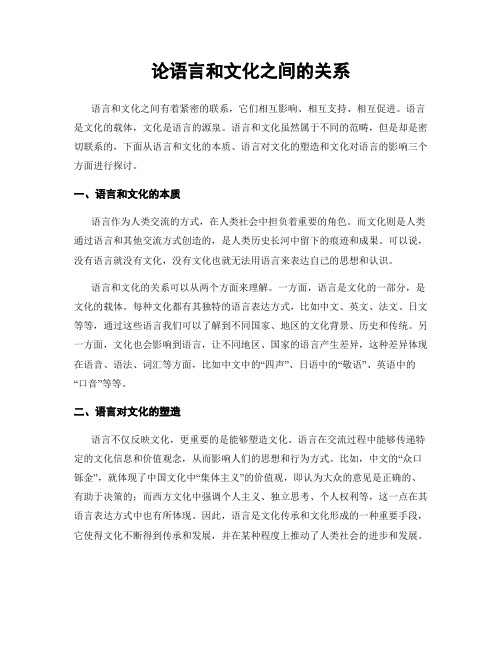
论语言和文化之间的关系语言和文化之间有着紧密的联系,它们相互影响、相互支持、相互促进。
语言是文化的载体,文化是语言的源泉。
语言和文化虽然属于不同的范畴,但是却是密切联系的,下面从语言和文化的本质、语言对文化的塑造和文化对语言的影响三个方面进行探讨。
一、语言和文化的本质语言作为人类交流的方式,在人类社会中担负着重要的角色。
而文化则是人类通过语言和其他交流方式创造的,是人类历史长河中留下的痕迹和成果。
可以说,没有语言就没有文化,没有文化也就无法用语言来表达自己的思想和认识。
语言和文化的关系可以从两个方面来理解。
一方面,语言是文化的一部分,是文化的载体。
每种文化都有其独特的语言表达方式,比如中文、英文、法文、日文等等,通过这些语言我们可以了解到不同国家、地区的文化背景、历史和传统。
另一方面,文化也会影响到语言,让不同地区、国家的语言产生差异,这种差异体现在语音、语法、词汇等方面,比如中文中的“四声”、日语中的“敬语”、英语中的“口音”等等。
二、语言对文化的塑造语言不仅反映文化,更重要的是能够塑造文化。
语言在交流过程中能够传递特定的文化信息和价值观念,从而影响人们的思想和行为方式。
比如,中文的“众口铄金”,就体现了中国文化中“集体主义”的价值观,即认为大众的意见是正确的、有助于决策的;而西方文化中强调个人主义、独立思考、个人权利等,这一点在其语言表达方式中也有所体现。
因此,语言是文化传承和文化形成的一种重要手段,它使得文化不断得到传承和发展,并在某种程度上推动了人类社会的进步和发展。
除此之外,语言也可以通过形成新的词汇、新的句法结构等方式,推动文化变革和发展。
如今,随着信息技术的发展,互联网语言的广泛使用,词汇的涌现和更新也日新月异,可以说,语言的变化让文化更具时代感、更紧贴现实。
三、文化对语言的影响与语言对文化的塑造不同,文化对语言的影响更多的体现在语言的运用方面。
不同文化背景下的人在交流时,会使用不同的语言表达方式,语音、语调、词汇等都会有所不同。
语言和文化之间的关系是什么?
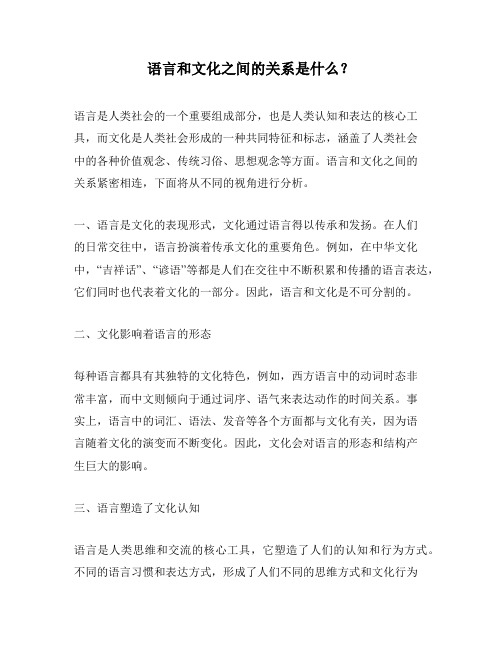
语言和文化之间的关系是什么?语言是人类社会的一个重要组成部分,也是人类认知和表达的核心工具,而文化是人类社会形成的一种共同特征和标志,涵盖了人类社会中的各种价值观念、传统习俗、思想观念等方面。
语言和文化之间的关系紧密相连,下面将从不同的视角进行分析。
一、语言是文化的表现形式,文化通过语言得以传承和发扬。
在人们的日常交往中,语言扮演着传承文化的重要角色。
例如,在中华文化中,“吉祥话”、“谚语”等都是人们在交往中不断积累和传播的语言表达,它们同时也代表着文化的一部分。
因此,语言和文化是不可分割的。
二、文化影响着语言的形态每种语言都具有其独特的文化特色,例如,西方语言中的动词时态非常丰富,而中文则倾向于通过词序、语气来表达动作的时间关系。
事实上,语言中的词汇、语法、发音等各个方面都与文化有关,因为语言随着文化的演变而不断变化。
因此,文化会对语言的形态和结构产生巨大的影响。
三、语言塑造了文化认知语言是人类思维和交流的核心工具,它塑造了人们的认知和行为方式。
不同的语言习惯和表达方式,形成了人们不同的思维方式和文化行为习惯。
例如,在中文中,“名利”与“仁义”并重,而西方文化则更加注重自由、平等和个人权利。
因此,语言不仅代表着文化,还影响了文化的形成和发展。
四、语言跨文化交流的重要性跨文化交流是语言和文化之间的重要桥梁,它有助于人们了解不同的文化,加深对不同文化之间的理解和尊重。
因此,掌握多种语言和文化,成为了现代社会中一个重要的人才需求。
综上所述,语言和文化之间的密不可分,它们相互影响、相互促进,是人类社会发展和进步的重要因素。
我们应该认识到语言和文化之间的关系,尊重多元文化,加强跨文化交流,推动全球文化交流繁荣发展。
语言与文化-罗常培
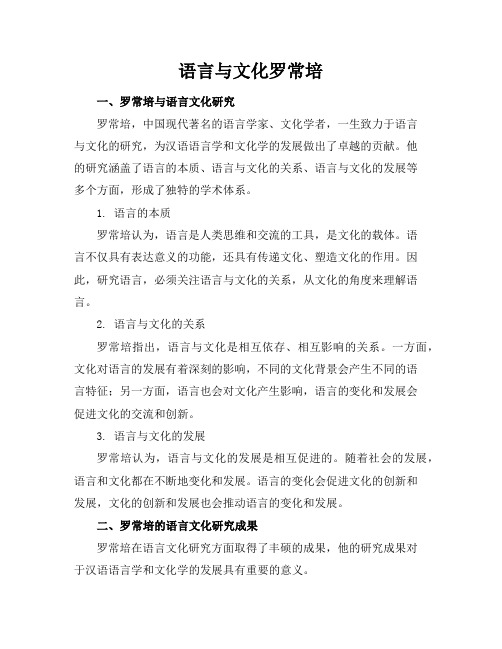
语言与文化罗常培一、罗常培与语言文化研究罗常培,中国现代著名的语言学家、文化学者,一生致力于语言与文化的研究,为汉语语言学和文化学的发展做出了卓越的贡献。
他的研究涵盖了语言的本质、语言与文化的关系、语言与文化的发展等多个方面,形成了独特的学术体系。
1. 语言的本质罗常培认为,语言是人类思维和交流的工具,是文化的载体。
语言不仅具有表达意义的功能,还具有传递文化、塑造文化的作用。
因此,研究语言,必须关注语言与文化的关系,从文化的角度来理解语言。
2. 语言与文化的关系罗常培指出,语言与文化是相互依存、相互影响的关系。
一方面,文化对语言的发展有着深刻的影响,不同的文化背景会产生不同的语言特征;另一方面,语言也会对文化产生影响,语言的变化和发展会促进文化的交流和创新。
3. 语言与文化的发展罗常培认为,语言与文化的发展是相互促进的。
随着社会的发展,语言和文化都在不断地变化和发展。
语言的变化会促进文化的创新和发展,文化的创新和发展也会推动语言的变化和发展。
二、罗常培的语言文化研究成果罗常培在语言文化研究方面取得了丰硕的成果,他的研究成果对于汉语语言学和文化学的发展具有重要的意义。
1. 《汉语方言研究》罗常培的《汉语方言研究》是汉语方言学的奠基之作,他通过对汉语方言的深入研究,揭示了汉语方言的分布规律、演变规律和语音、词汇、语法等方面的特点,为汉语方言学的发展奠定了基础。
2. 《中国语言学史》3. 《中国文化与语言》罗常培的《中国文化与语言》是中国语言文化学的开创之作,他通过对中国文化和语言的研究,揭示了中国文化和语言的关系、特点和规律,为语言文化学的发展奠定了基础。
三、罗常培对语言文化研究的贡献1. 奠定了汉语语言学的基础罗常培通过对汉语方言、汉语语言学史等的研究,奠定了汉语语言学的基础,为汉语语言学的发展提供了重要的理论支持和实践指导。
2. 推动了语言文化学的发展罗常培通过对中国文化和语言的研究,推动了中国语言文化学的发展,为语言文化学的研究提供了重要的理论框架和方法论指导。
语言和文化的定义

语言和文化的定义1. 语言啊,那可不就是人与人交流的桥梁嘛!就像你和朋友聊天,用的那些话就是语言呀。
比如,你说:“咱晚上吃啥呀?”这就是简单又平常的语言表达。
文化呢,则是一群人共同拥有的那些习惯、传统啥的。
好比春节,那就是咱中国文化的一部分呀!2. 语言不就是我们表达自己想法的工具嘛!你想想,你跟爸妈说“我爱你”,这三个字就是一种语言呀。
而文化就像一个大宝藏,包含了各种有趣的东西。
就说端午节赛龙舟,这多有意思呀,这就是文化的体现呢!3. 语言啊,简直就是打开他人心扉的钥匙!当你对别人说句温暖的问候,那就是语言在发挥作用。
文化呢,就如同一个大染缸,把大家染成了有共同特点的一群人。
像日本的动漫文化,多有影响力呀!4. 语言不就是让我们能互相理解的那个玩意儿嘛!你讲个笑话逗大家笑,靠的就是语言呀。
文化就好像是一片广阔的海洋,深不可测又充满魅力。
像印度的舞蹈文化,那独特的舞姿多迷人啊!5. 语言呀,那可是我们生活中不能缺少的呀!你喊朋友一起玩,这就是语言的用处呀。
文化就像是一座神秘的城堡,里面藏着无数的秘密和精彩。
比如西方的骑士文化,哇,多酷呀!6. 语言不就是我们传递情感的途径嘛!当你对喜欢的人表白,那些话就是语言的魔法呀。
文化呢,就好像是天空中的星星,闪耀着独特的光芒。
像非洲的部落文化,多有特色啊!7. 语言啊,就是我们每天都在用的东西呀!你说句“早上好”,这就是简单的语言呀。
文化就如同一个大花园,各种花朵争奇斗艳。
像韩国的流行文化,多受年轻人喜欢啊!8. 语言不就是让我们沟通的手段嘛!你和同学讨论问题,靠的就是语言呀。
文化就好像是一本厚厚的书,每一页都有精彩的故事。
像法国的时尚文化,引领着潮流呢!9. 语言呀,那可是我们和世界连接的纽带啊!你跟外国人说句“Hello”,这就是语言的魅力呀。
文化就像是一幅绚丽的画卷,展现着不同的色彩。
像意大利的美食文化,多诱人啊!10. 语言不就是我们表达内心的方式嘛!你倾诉自己的烦恼,用的就是语言呀。
- 1、下载文档前请自行甄别文档内容的完整性,平台不提供额外的编辑、内容补充、找答案等附加服务。
- 2、"仅部分预览"的文档,不可在线预览部分如存在完整性等问题,可反馈申请退款(可完整预览的文档不适用该条件!)。
- 3、如文档侵犯您的权益,请联系客服反馈,我们会尽快为您处理(人工客服工作时间:9:00-18:30)。
作为文化一部分的语言和作为文化传播媒介的语言所具有的双重性,确定了语言与文化的不可分割性。
The duality that language is not only part of the culture but also part of cultural media determines the indivisibility of language and culture.其次,语言是文化的载体。
语言是一种传播媒介或者交际工具,作为约定俗成的符号系统,语言是文化的载体,能够承载各种信息;语言作为一种文化现象,本身就有着非常丰富的文化内涵。
词汇是语言的基本要素,也是语言系统赖以存在的支柱,因此文化差异在词汇层次体现得最为突出、最为广泛。
同一个词语在不同的文化中会产生不同的联想意义(Associative Meaning),如“红色(red)”在中国文化中表示喜庆、欢快、热闹;而在英语国家则是表示愤怒、气愤的意思。
“龙(dragon)”在中国文化中是一种能兴云降雨的神兽或神异动物,是封建时代帝王的象征,也是我们中华民族的象征;但是,在英语国家中,“龙”却被看做是能喷火的可怕的怪物,代表邪恶的力量或势力。
Secondly, language is the carrier of culture. Language is a kind of medium or a communication tool, as a conventional symbol system, language is capable of carrying all kinds of information; as a cultural phenomenon, language itself has very rich cultural connotations. V ocabulary is the basic element of language, butalso the backbone upon which the language system can exist, therefore the cultural differences in vocabulary level is the most prominent and the most widely. The same words in different cultures can produce different associative meanings, such as “red” in Chinese culture represents festive,cheerful,lively and good luck; while in the English-speaking countries it means angry and violence. “Dragon” in Chinese culture is a miraculous animal, it is a symbol of the emperor in the feudal era, but also a symbol of our nation; However, in the English-speaking countries, “dragon” is regarded as the horrible monster which is capable of spraying fire a nd represents evil power or forces.文化差异在习语(Idiom)中体现得更为突出。
习语的形成与语言所属的民族文化是紧密相连的。
每个民族都有其自身的民族文化,这就是各民族在生产劳动、生活过程中形成的独特的风格与传统,其中包含着历史、语言、风俗、生活方式、思维方式和婚姻习俗等。
习语是经过人们长期使用、千锤百炼而成的语言形式,它在很大程度上依赖于特定的社会文化背景,因此习语比词汇更富于文化内涵。
习语产生与文化,反过来,习语又反映文化的各个方面。
英国人早期的生活很大程度上依赖于海洋,所以创造了所谓的“海洋文化”,英语中有不少习语源于海上的生活。
Cultural differences reflected in the idiom is more prominent.The formation of idioms is closely linked with the national culturelanguage belongs to. Every nation has its own culture,that is the unique style and tradition all ethnic groups formed in the process of producing labor and living, including history, language, customs, lifestyles, ways of thinking and marriage customs. Idioms are language forms used by people for a long time, and it largely depends on the particular social and cultural background, therefore idioms are more rich in cultural connotation than vocabulary. Idioms generate from culture, in turn, idioms reflect all aspects of culture. The early life of British is largely dependent on the ocean, so it creates a so-called "marine culture", there are many English idioms deriving from the sea life.再次,语言与文化相互作用。
语言与文化的相互作用体现为语言承载文化,文化制约语言。
我们可以从两个方面认识和理解语言与文化之间的互动关系。
一方面,思维方式是一种文化现象。
语言是思维最有效的工具,思维活动需要借助语言来进行,思维的结果也要用语言来表达,思维和语言存在密切的关系。
不同民族所生活的自然环境和社会环境有所不同,各民族的思维方式就有各自的特点,思维方式存在的差异肯定会对语言产生极大的影响,具体表现在句子结构、语篇结构、表达方式、逻辑顺序等方面。
语言与思维相互影响,相互制约。
Finally, f rom a dynamic view, language and culture interact with each other. Theinteraction between language and culture is reflected in that language carries culture and culture restricts language. We can recognize and understand the interaction between language and culture from two aspects. On the one hand, the way of thinking is a kind of cultural phenomenon. Language is the most effective tool for thinking because thinking activities need to be carried out by means of language and the result of thinking also needs language to express, that’s to say there is a close relationship between thinking and language. Different ethnic groups live in the different natural and social environment, therefore the way of thinking of all ethnic groups have their own characteristics, undoubtedly the differences existing in the way of thinking will certainly have a significant impact on the language, specifically embodied in the sentence structure, discourse structure, means of expression, a logical sequence and so on. Language and thinking influence and restrain each other.On the other hand, language is the carrier of culture, culture promotes the development and evolution of language. As a tool of cultural transmission,language plays a very important role in the transmission and penetration of culture. Meanwhile,the transmission of culture also promotes the development and evolution of language. English vocabulary is very rich, and themain reason includes that the United Kingdom suffered the invasion and conquest of foreign forces in different historical periods, foreign culture and language have a profound influence on English, and English has absorbed or borrowed a lot of words of different languages in its process of transmission.语言和文化的相互依存性决定了语言教学必须与文化教学相结合。
